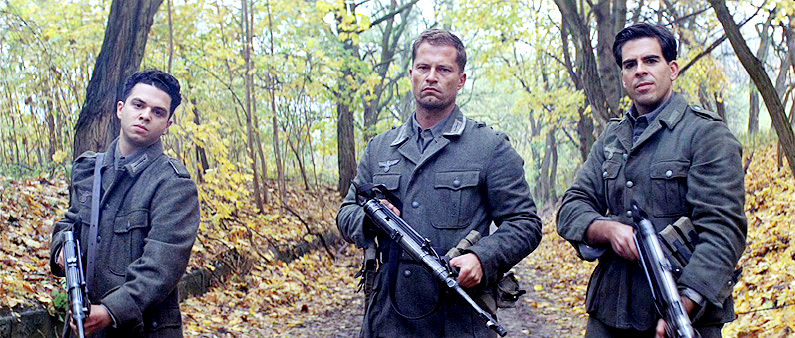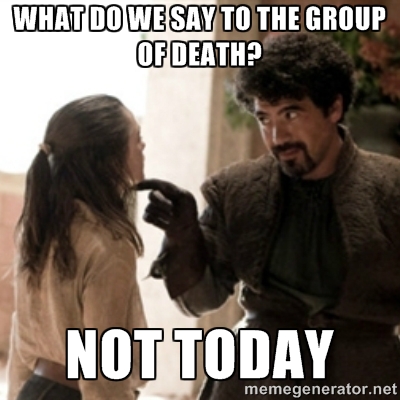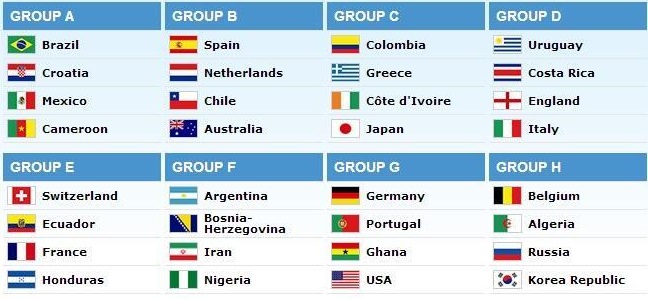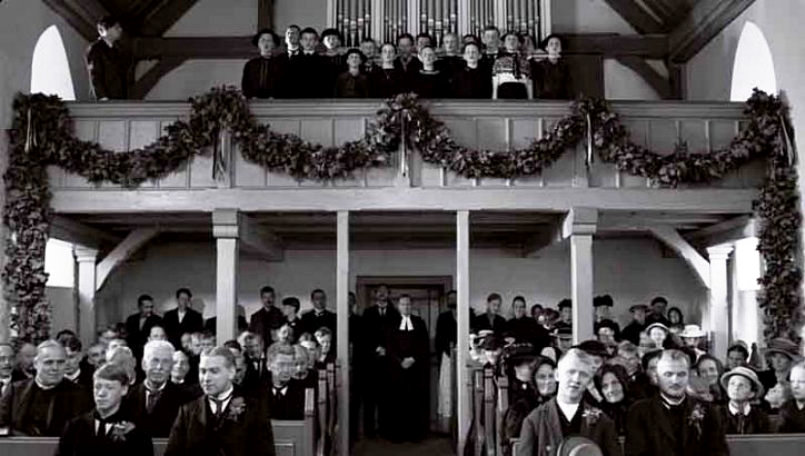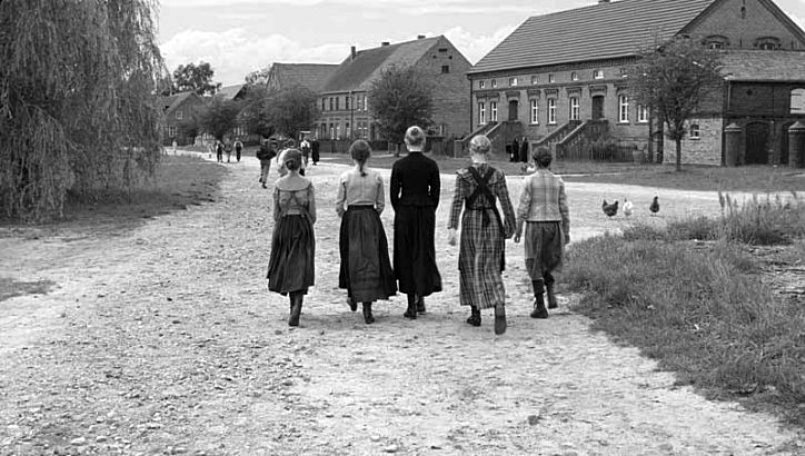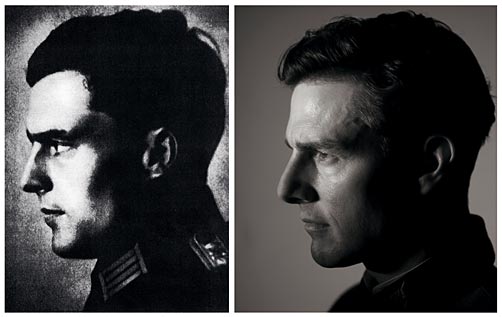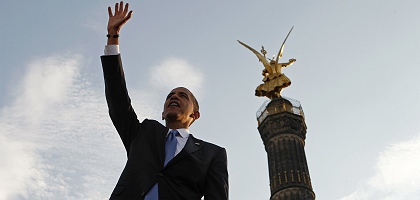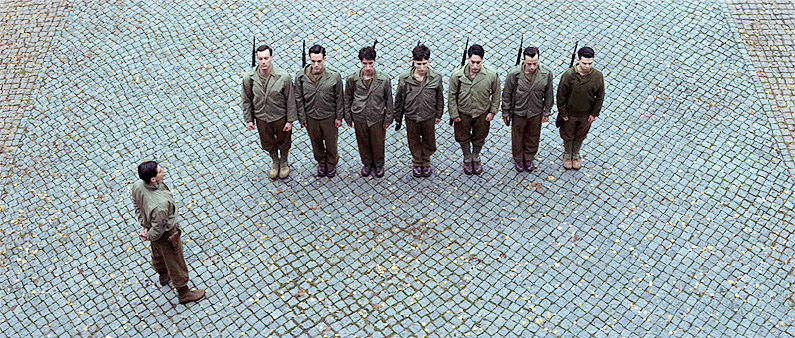
A weekend chock-full of movies on this end, beginning with a Friday night outing to
Quentin Tarantino’s striking, rambling Inglourious Basterds. I’ve been down on pretty much everything QT has done over the past decade —
Kill Bill, Vol. 1,
Kill Bill, Vol. 2,
Death Proof — but
Basterds at last feels like a movie by the writer-director who gave us
Reservoir Dogs,
Pulp Fiction, and the underappreciated
Jackie Brown. To be honest, it’s hard to say whether Tarantino has finally reversed his decade-long slide into his own solipsistic, homage-heavy universe (which is the three-dollar way of describing his recent tendency to disappear up his own ass), or — more likely — that QT’s riffing on European film as much as 70’s exploitation flicks here makes this movie feel broader than the last few forays. Nevertheless, for whatever reason,
Basterds works, and it is a welcome return-to-form.
Perhaps part of the reason I enjoyed the film was that I went in with egregiously low expectations. Particularly with Hostel director Eli Roth skulking about the premises — he’s Donny Donowitz, a.k.a. the “Bear Jew,” a Boston-born basterd who likes to go yahd on Nazi skulls with his Louisville Slugger — I went in thinking that this movie would basically be two and a half hours of grisly torture porn — or , in other words, the ear scene from Reservoir Dogs over and over again, made “ok” because the victims are Nazis. But Inglourious Basterds is both broader and more subtle than that. Yes, there’s some of that going on — particularly in Chapter 2 — but it’s handled much more expertly than I feared. (Nor are the victims in question just cartoon Nazis out of Raiders of the Lost Ark, but multi-dimensional individuals in a huge spot of trouble.)
And, in any case, the Basterds are really a small part of the film as a whole. Borrowing liberally from The Good, The Bad, and The Ugly at the start, the movie begins in 1941 France with the interrogation of a French farmer (Denis Menochet) who may or may not be harboring his Jewish neighbors. His interlocutor is the courtly SS Colonel Hans Landa (Christophe Waltz, a bit over-the-top but probably a shoo-in for a Supporting Actor nod) who, in a wide-ranging conversation about milk, hawks, pipes, and paperwork, methodically picks apart the poor dairy farmer like a boy pinning down a butterfly. Then, we meet the Basterds, the elite unit of Jewish soldiers — led by “Aldo the Apache” Raine (Brad Pitt, also playing it broad) — who are kicking ass and taking manes all across Europe. Their dastardly exploits have even caught the attention of the German High Command — including the Fuhrer himself (Martin Wuttke), who wants them dead, like, yesterday. (Speaking of which, the early scenes in the FHQ, with Hitler throwing a tantrum over the Basterds, felt a lot like how I’d imagine a WWII-era Captain America film might pan out.)
Minister of Propaganda Joseph Goebbels (Sylvester Groth), meanwhile, is more interested in getting his newest propaganda film — A Nation’s Pride, about the Sgt. York-like heroics of one German sniper (Daniel Bruhl) — the grand opening it deserves in Nazi-occupied Paris. To that end, and on the advice of said sniper (who’s a bit smitten with the proprietor), he looks to book the premiere at a theater run by a melancholy French beauty named Emmanuelle Mimieux (Melanie Laurent). But Emmanuelle, it turns out, is in fact named Shoshanna — we met her earlier in the film — and she more than most has a score to settle with these godawful Nazis. And, like Herr Goebbels, she knows a thing or two about using the cinema to make a dramatic statement…
I haven’t even mentioned the German actress/double-agent Bridget von Hammersmark (Diane Kruger), or the dashing British film critic-turned-lieutenant, Archie Hicox (Michael Fassbender), or Hugo Stiglitz (Til Schweiger), the expert Nazi-killer sprung by the Basterds for bad behavior, or military mastermind Gen. Ed Fenech (Mike Myers, distracting but getting to live out his Peter Sellers dream some more), the man with a plan to knock out the German High Command in one fell swoop. Yes, this film is a truly baroque creation. It’s more a collection of loosely-related setpieces, to be honest, and some work better than others (A vignette involving a rendezvous-gone-south in a basement pub is a masterpiece of slowly-ratcheting suspense; the scene where Shoshanna is forced to eat dinner with a gaggle of Nazis feels ten minutes too long.)
Although most of the speaking here is conducted in French, German, or really-bad Italian (it’s all lovely to listen to, by the way — the musicality of QT’s dialogue definitely carries over into other languages), this is a Tarantino movie through and through. We have the long, meandering conversations punctuated by staccato bursts of violence. (See also: Any other Tarantino film.) We have the throwback homage-ridden score (Mostly Morricone, but David Bowie’s “Cat People” shows up in a truly odd spot.) We have the random digressions on “Pop Culture According to QT.” (There’s an extended riff on King Kong here that momentarily took me out of the film.) We have an obvious lapse into foot fetishism (the Cinderella scene, which, imho, doesn’t make much sense given what happens later.) There are, of course, several Mexican standoffs. It’s all very Tarantino, alright.
And we have the powerful ending, which I won’t give away in detail here. [Warning: This rest of this review is spoilerish.] As several characters say in Chapter 5, “the shoe’s on the other foot now.” And it is — After the tension-wracked first chapter, Basterds completely inverts the usual Cat-and-Maus relationship inherent to almost all movies of this genre. The political economy of IB is hardly what you’d call Zen, and if “turn the other cheek” is your moral touchstone, then the ending is deplorable in many ways. (Even Tarantino seems to think so, given that we the audience have basically the same reaction to Basterds as the Nazis do to A Nation’s Pride.) That being said, it’s a weirdly and undeniably intoxicating thing to see the Jewish Basterds being the guys holding the guns for once, and to witness their disembodied, cackling Avenging Angel exult in a vengeance long denied.
After all its Eurocinema-meets-The Dirty Dozen twists-and-turns, Inglourious Basterds ends up being a sort of a Leni Riefenstahl film for the Jews. And, well, propaganda it may be, but you don’t have to be a Tarantino-level foot fetishist to find it at least somewhat refreshing, even exhilarating, to see that boot on the other heel for once.
